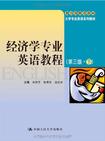经济学专业英语教程(第三版·下)
出版时间:2012-10 出版社:中国人民大学出版社 作者:宋利芳 等主编 页数:310 字数:434000
内容概要
《大学专业英语系列教材:经济学专业英语教程(第3版·下)》适合目前在校的大学二至三年级学生,是较为理想的英语加专业知识的“大学英语”教材。本书兼顾英语语言的学习应用和经济学专业知识两个方面。学生在锻炼英语应用能力的同时,又可学到经济学方面的知识。 本书共有14单元,每一单元包括主课文和副课文,内容涉及应用经济学以及经济管理和经济实务方面的主要问题。各单元的主课文内容分别为:第一单元:收入和工作;第二单元:人口;第三单元:人力资源管理;第四单元:环境保护;第五单元:投资;第六单元:保险;第七单元:市场营销;第八单元:国际贸易;第九单元:世界贸易组织;第十单元:非关税壁垒;第十一单元:跨国公司;第十二单元:外国援助;第十三单元:经济全球化;第十四单元:欧洲联盟。 就内容而言,下册比上册的涉及面广。不仅有宏观经济学和微观经济学的内容,同时增加了当今世界经济发展所涉及的话题,如:跨国公司、环境保护、WTO以及欧盟概况等。下册各单元主课文的语言难度比较适中。主课文难度没有大的跳跃,前后较一致,是经济学专业的入门课程。课文注释包括两个方面:英语语言点和经济学术语。 各单元生词的释义基本采用英、汉双解形式。生词起点以教育部公布的《大学英语教学大纲通用词汇表》中的四级以上词汇为准。 各单元练习的设计和编排旨在培养和提高学生应用英语的能力,帮助学生掌握经}济学基本概念和基本理论以及专业术语。教师在要求学生掌握基本经济学知识的同时,还应强调学生的口头交流能力和笔头表达能力,尽可能在课上多给学生一些语言实践的机会,应注意口头练习和笔头练习的结合,个人发言和小组讨论的结合。根据学生的专业情况和英语水平,教师可对课文和练习内容进行灵活处理。本书结构严谨,内容权威,知识通俗,是经济学专业本科生的参考教材、非经济学专业本科生的通识课教材。
书籍目录
Unit One
Text: Income and Work
Additional Text: Income Distribution and Poverty
Unit Two
Text: Population
Additional Text: The Coequences of High Fertility:
Some Conflicting Opinio
Unit Three
Text: Human Resources Management
Additional Text: The Exteive Brain Drain
Unit Four
Text: Environmental Protection
Additional Text: Methods of Pollution Control
Unit Five
Text: Investments
Additional Text: The Major Types of Investo
Unit Six
Text: Iurance
Additional Text: Types of Iurance Businesses Need
Unit Seven
Text: Marketing
Additional Text: Marketing Strategies
Unit Eight
Text: International Trade
Additional Text: National Competitive Advantage and Diamond
Model
Unit Nine
Text: WTO
Additional Text: GATT and Multilateral Trade Negotiatio
Unit Ten
Text: Nontariff Barrie
Additional Text: Dumping and Antidumping
Unit Eleven
Text: Multinational Corporatio
Additional Text: Foreign Direct Investment and Multinational
Enterprises
Unit Twelve
Text: Foreign Aid
Additional Text: Tne World Bank Group and the International
Monetary Fund
Unit Thirteen
Text: Economic Globalization
Additional Text: Regional Economic Integration
Unit Fourteen
Text: The Ruropean Union
Additional Text: The Broad Economic Guidelines of the EU
Appendix Ⅰ Awe to Exercises
Appendix Ⅱ Chinese Tralation of the Texts
章节摘录
The free-trader's first instinct is to welcome dumping and thank the exporting country. After all, we do not usuaLly argue when someone tries to sell us something at a low price. This instinct seems clearly correct for persistent dumping. Compared to the high price in the exporting country, the importing country gets the gains from additional trade at the low export price. The importing country's terms of trade are better, and the benefits to consumers are larger than the losses to the importcompeting producers. To see this, consider what will happen to the importing country if it imposes a tariff on the dumped imports, to force the tariff-inclusive price up to about the level in the exporting country. For example, the duty would be 140 percent (=(60-25)/25). This duty is prohibitive: The Japanese firm ceases all exports to the United States, and the United States thus loses all gains from trade in this product. Through similar logic, the importing country generally should welcome seasonal and introductory-price dumping. Cyclical dumping raises an additional issue for the importing country. If the foreign exporter is particularly aggressive, then it will gain export sajes that permit it to maintain production and employment. Since the import-competing firms lose sales, the exporting country is in effect "exporting unemployment." The importing country is harmed temporarily, and there may be a case for temporary government policies to fight cyclical dumping. However, viewed in another way, the case of cyclical dumping is not so clearcut. Much of the time cyclical dumping is not an aggressive strategy to export unemployment, but rather the normal working of a competitive marketplace. When there is a temporary downturn in demand, price falls in a competitive market, and firms move down their supply curves. For a competitive industry, price will fall below full average cost in this situation, because firms will continue to produce and sell as long as the market price is above average variable cost. This is exactly what we want to happen when there is a recession in demand, so there is little economic basis for the importing country's government to fight cyclical dumping ifit reflects the normal working of competitive markets. Predatory dumping is the most troubling type of dumping for the importing country. Although the importing country gains from low-priced imports in the short run, it will lose because of high-priced imports once the exporting firm succeeds in establishing its monopoly power. A key question is how frequently foreign firms use predatory dumping. Predatory dumping of manufacturing goods was widely alleged during the international chaos of the 1920s and 1930s. In truth, there is no clear evidence that widespread predatory dumping has been practiced, despite a rich folklore about it. Predatory dumping is likely to be rare in modern markets. The firm considering predatory dumping must weigh the losses from low prices that are certain in the short run against the possible but uncertain profits in the more distant future. Indeed, even if the firm drives out its current competitors in the importing country, it may find that, once it raises prices, new firms, including new exporters from other countries, enter as competitors. Recent research suggests that no more than 5 percent of all cases of alleged dumping in the United States and the European Union show even a moderate possibility for predation (and it is possible that none of these cases involves predation). ……
图书封面
评论、评分、阅读与下载
用户评论 (总计1条)
- 西方经济学的专业英语,可以自学。
推荐图书
- 观光蔬菜景观设计与种植技术
- 沈阳经济区农业产业结构演进及效益评价
- 十二五期间第一批热带南亚热带作物主导品种和主推技术
- 中国农业统计资料2011
- 枣生产配套技术手册
- 果园机械与设施
- 现代化进程中重庆政府公共服务能力供给研究
- 中国农产品贸易发展报告2012
- 中国农业鼠害防控技术培训指南
- 梨生产配套技术手册
- 饲料加工及检测技术
- 国际减贫理论与前沿问题2012
- 解决三农问题的根本途径研究
- 苏州现代农业的理念与实践
- 狐假虎威
- 大耳朵图图故事屋6
- 大耳朵图图故事屋7
- 大耳朵图图故事屋9
- 大耳朵图图故事屋8
- 大耳朵图图故事屋10
- 成长的烦恼600问
- 成长的烦恼600问
- 小橘宝图画馆·黑鱼娶亲
- 2013年法律硕士联考模拟试卷
- 唤醒红楼梦
